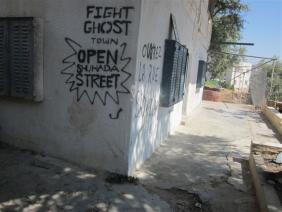Hebron, Mon 25.6.12, Morning

Translator: Charles K.
Hebron
The occupation’s routine is in place from the Meitar checkpoint on. School vacation in the occupied territories has begun; everything’s slowly coming to life. People who had to go to work have already left.
Everything seems normal, in Hebron as well. Quiet, quiet, quiet. No detainees at any checkpoint. Many children carrying empty detergent pails on their way to the mosque to get soup. Usually water and flour; once a week it also contains meat. The main entrance is still closed. “Derech HaBanim” is being renovated.
at any checkpoint. Many children carrying empty detergent pails on their way to the mosque to get soup. Usually water and flour; once a week it also contains meat. The main entrance is still closed. “Derech HaBanim” is being renovated.
The guard at the southern entrance to Kiryat Araba says, apologetically, “I’ve been told to ask where you work…” We’re lucky he made do with our usual reply and didn’t delay us .
.
We went to visit B., who’s unfortunate enough to live next to Beit HaMeriva. He wants to add a second floor, but the settlers aren’t letting him do so. Representatives of the Jewish settlement came, attacked, threatened, left signs reading “No terror cell on the way to the Cave of the Patriarchs.”
It’s clear who runs things there.
His sons greet us at the shop, in half of which is a shoe-sewing workshop; the other half is a grocery. “Dad is at the Palestinian police station in town; he went to obtain a final building permit.”
Farther on, near Curve 160, we meet a street cleaner. He pulls his pail and wheelbarrow, employed by the municipality to clean the worshippers route. We learn that he also lives next to the road, near Beit HaMeriva that’s in the army’s hands. His house – actually, a small shed – isn’t far from the gate between Kiryat Arba and Hebron. He’s also unfortunate enough to own a piece of land in the area that’s attractive to the settlers, who want it. They plan to create a continuous stretch of territory owned by Jews from the Cave of the Patriarchs to Kiryat Arba. They stop at nothing to achieve their goal.
So the street cleaner (in Hebrew he’s called a “zabal”), who earns NIS 1500/month, is subject to threats, pressures, arrested under various pretexts, offered money – to make him sell some of his land, or, alternatively, be punished if he dares to enlarge his house ever so slightly.
It seems that, in local traditional culture, street cleaners are viewed as possessing special powers, unusual abilities – they clean the streets and are seen everywhere. That’s what M., our driver and friend, told us.
It doesn’t seem that any of those in Hebron has the power to resist the settlers’ evil.
How much strength does an ordinary person need to live a normal, honest life? What tests do these scoundrels impose on people whose home this is, who have nowhere to go?
Curve 160
What we can see here are razor wire installations ready for deployment (When?! There’s no way of knowing), and also a revolving gate waiting to be installed. The curve will apparently be “upgraded;” instead of just a booth manned by the Border Police and a yellow gate it will become another checkpoint on the way from the Jebel Juhar neighborhood to the Cave of the Patriarchs. A police vehicle is parked right at the turn to Bani Na’im along with a vehicle from Mekorot and various Palestinian vehicles.
Something’s going on there.
We went over to find out. The police officers: “Can we help you?” “No, we’re just looking at what’s going on here.” “Just maintenance work,” they reply.
The people from Mekorot tell us something very different: “People are stealing water; we came to inspect the pipes and block what has to be blocked.”
On the way back, at the Meitar crossing, we’re greeted: “Watch, how are you?” We don’t have to show IDs. A beggar’s holiday.
